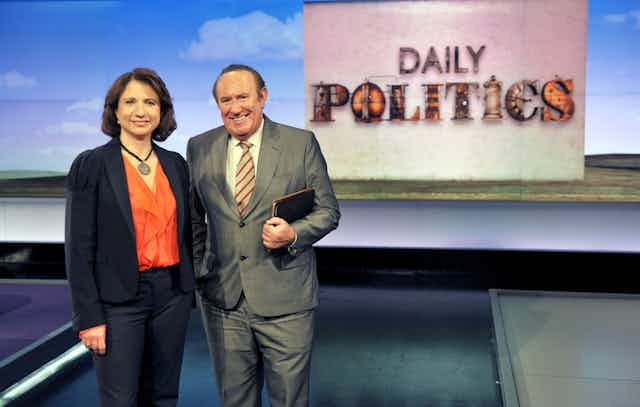The international trade secretary Liam Fox is once again baying for BBC blood, claiming the public broadcaster has nothing positive to say about Brexit. It’s not the first time Fox has got his blood up about perceived bias at the Beeb. But it must have come as something of a surprise to Robbie Gibb who, until a few weeks ago, was the BBC’s head of political programmes.
A surprise because Gibb is now ensconced as Theresa May’s director of communications – and the notion that the BBC is a nest of lefties flies in the face of reality, with a succession of right-wingers currently, or previously, holding prominent roles in its news and current affairs output.
For example, Gibb’s main competitor for the job at Number 10 was James Lansdale, the BBC’s diplomatic editor. David Cameron’s communications chief when he was prime minister was Craig Oliver, a former editor of BBC News. Meanwhile Boris Johnson, on his appointment as mayor of London, called on the services of BBC political correspondent, Guto Harri, to head his spin team.
No one gets more political airtime on BBC screens currently than Andrew Neil, who has never made any secret of his Tory leanings. He previously worked for the Conservative’s research department and now chairs the holding company that owns the Daily Telegraph and the Spectator. Superb interviewer that he is, is it right that any broadcaster – whatever his or her political leanings – should so dominate the BBC’s political coverage as does Neil, fronting the weekday Daily Politics show and presenting his own programmes on Sunday mornings and Thursday evening?
It is not being argued here that the BBC is biased towards the right nor, for that matter, to the left, but it does have a bias - and that is towards the consensus, as it sees it. A succession of senior BBC journalists have accepted that the corporation’s political coverage often struggles to escape the Westminster bubble – one reason, perhaps, why the BBC’s coverage of the last two general elections and the EU referendum failed to adequately reflect the national mood. But the BBC’s calibration as to where that centre lies has gone somewhat awry – or just hasn’t yet adjusted to the rise of Jeremy Corbyn.
Political balance
Take, for example, the BBC’s two flagship Sunday political programmes presented respectively by Andrew Marr and Neil. Both programmes, apart from having big-name political interviews, also include three-person panels of journalists and politicians whose job is to review the Sunday papers and set the tone for the programme. On July 23, for example, the Andrew Marr Show opened with a panel that consisted of Gisela Stewart the centrist Labour MP, Anna Soubry, the centrist Tory MP, and the unashamedly right-wing journalist and campaigner Toby Young. This, in itself, would not be problematic since the BBC’s editorial guidelines – rightly in my view – talk of “due impartiality” across the output, rather than a mechanistic left/right balance in every programme.

However, in the seven weeks that I have been monitoring the two Sunday political programmes there has been no balance in the make-up of their respective press panels. Indeed, what has been impressive is the almost mathematical precision its producers have achieved in ensuring that every programme has a “balance” of two right-wingers to one left-winger.
The Sunday before last, for instance, the Marr programme featured a panel of Ayesha Hazarika, Ed Miliband’s former adviser, Jane Moore from The Sun and former Tory leader Ian Duncan-Smith. An hour or so later, the Andrew Neil Show began with another “balanced” panel consisting of Steve Richards, who writes for the Guardian and the Independent, political editor of The Sun, Tom Newton-Dunn, and right-wing journalist Isobel Oakeshott formerly of the Daily Mail and Sunday Times.
I monitored the panels of the two programmes from June 11 to July 23 2017 and found that of the 39 panellists (there was no Neil show on July 23), 27 have been from the right or centre-right, ten from the centre-left, one from the left (the editor of the Canary website Kerry Anne-Mendoza and one of no declared political position: the BBC presenter, Victoria Derbyshire. In other words, a more than two-to-one bias to the right or centre-right on these panels, which – given the consistency over the period monitored – cannot simply be attributed to happenstance.
Moving the fulcrum
But is this imbalance of any real significance? The answer, in my view is yes – on two levels. First, because these press panels play a crucial role in setting the dominant narrative for the show. But – perhaps more importantly – they are indicative of where the BBC’s political staff believe the current centre of political balance to lie. Most observers accept that the political centre moves. Under Thatcher and Blair, it was to the right of the post-war consensus (the consensus essentially accepted the mixed economy and the welfare state) but since the 2017 general election – if not before – I believe it has clearly moved to the left. That is yet to be reflected across the BBC’s coverage.
This is not to suggest that the BBC does not have a good team of political journalists providing reliable and informative coverage – they do. But it does suggest a mindset within the BBC, almost certainly unconscious, that has yet to recognise the new political realities. The BBC is a public service broadcaster – and a good one too – but it is vital that in carrying out its function of reflecting Britain back to itself, the picture it has of the country is a reasonably accurate one.
Young people are now increasingly turning to social media as their first source of information about current events. If the BBC is to win back this section of the audience – or at least stem the ebbing tide – it needs to examine, and respond quickly, to the current mote in its political eye.

